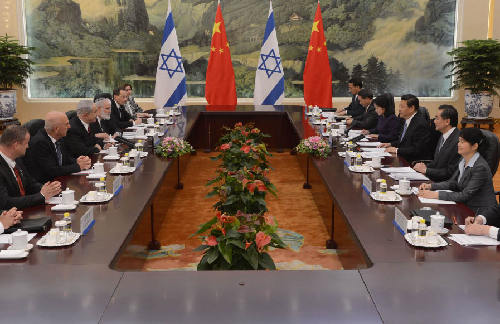Contribute Positive Energy to the Middle East Peace Process
Both Abbas and Netanyahu voiced satisfaction at the results of their visits as well as their high regard for China, and expectations that the country might influence the Middle East peace process. The leaders also expressed hopes of a speedy resumption of peace talks. Abbas later remarked to Arab envoys that, from the first to the current generation of Chinese leaders, the principle and stance of supporting the just cause of Palestine has remained consistent. China is thus a trustworthy friend and brother.
|
 |
| Chinese President Xi Jinping and Israeli Prime Minister Benjamin Netanyahu at the Great Hall of the People on May 9,2013. |
Main Obstacle
Promoting a solution to the Israeli-Palestinian conflict is still a long way off. Unless it is resolved, the Palestinian issue will have negative influence throughout the Middle East. President Xi made this point in his talks with the leaders of Palestine and Israel. The Palestine issue involves Arabs and Jews, both of whom have long histories. In earlier times, both lived in the area perceived by Judaism, Christianity and Islam as the Holy Land. Resolving the Israeli-Palestinian dispute hence involves the relationship between the Arabic and Jewish nations and other multiple complex relations among nations, religions and countries. But land is the most fundamental issue. That other major powers also exert their influence in the region complicates the situation.
Palestine lost all its territory after the third Arab-Israeli War in 1967. Palestine and Israel signed the historically significant Oslo Accords 20 years ago. Today, although the Palestine Authority has been established for many years, the reconciliation process between Palestine and Israel has nevertheless experienced twists and turns. Palestine has long sought to establish itself as a country based on the borders defined in 1967. At the same time, it accepts certain territorial exchanges on the basis of such borders, whereby Palestine and Israel exchange small tracts of land under a “two-state solution.”
During my visit to Palestine at the end of April the leaders I met with expressed expectations that I would convey to Israel their hopes of its compiling a map showing the relevant borders for discussion. The status of Jerusalem is another thorny problem. After the 1967 war, Israel occupied Jerusalem. Palestine, meanwhile, insisted on establishing a country whose capital would be in east Jerusalem. Land ownership is thus the root of the issue.
Resolution of the Israeli-Palestinian dispute demands adherence to the “land for peace” principle, which discussion is the sole political means of achieving. Abbas stressed that a political solution is the best and only way forward. Palestine insisted on peace and sought negotiation on the basis of the “two-state solution” to eventually achieve peaceful coexistence. Netanyahu said during his China visit that Israel desired peace, and that it would be willing to achieve it through negotiation. Israel also expressed appreciation of China’s efforts to promote the Middle East peace process and its desire to maintain communication with China.
Although both Palestine and Israel want to negotiate, neither trusts the other. Radical domestic forces in both countries moreover exacerbate the difficulty of the process. The Chinese government must support and promote the Middle East peace process through negotiation, based on mutually accepted principles like “land for peace” and relevant resolutions of the United Nations and the Arab Peace Initiative. China is also willing to cooperate with the international community in promoting confidence-building and a negotiated settlement.
Broader Concerns
The regional situation of WANA is also a key issue that needed consultation among Chinese, Palestinian and Israeli leaders. As to political changes in Arabic countries that are experiencing turmoil, China from the outset stressed that it respected the choices made by their people. This policy has been proven through diplomatic practice. After regime changes in certain WANA countries, China maintained and developed good relationships that led to bilateral cooperation. China is willing to strengthen cooperation in governance and economic development. China moreover hopes that different political forces will seek shared interests and resolve differences through dialogue and negotiation, thus minimizing the transition period.
This policy applies to the current situation in Syria. China adheres to the principle whereby the nation’s people should decide its future. China unequivocally opposes foreign interference, especially military intervention. By the same token, it has not merely sat by and watched, but worked hard to promote peace. China stressed that all parties in Syria should cease violent actions immediately, and solve conflicts through negotiation. No matter whether dealing with the Syrian government, or opposition at home or abroad, China has contacted and guided them towards the negotiating table, maintaining that the notion of conquering through military means should be given up as fantasy. China does not protect those in power, or favor any particular side, because it has neither the strength nor inclination to do so. China’s focus is on friendship with Syria, the interests of its people, and peace and stability in the region.
There is an old Chinese saying, “Three feet of ice are not frozen in a day.” The Middle East issue is complicated and far-reaching, and cannot be resolved overnight. Relevant parties and the international community should be aware of the urgency of the situation. But they must at the same time muster the patience necessary to generate confidence enough for all parties to negotiate, establish mutual trust and eventually set up a Palestinian nation. Only then can peaceful co-existence between Palestine and Israel, between the Arabic and Jewish nations and peace and prosperity in the Middle East be achieved. China is willing to pool its efforts with those of all concerned in the Middle East and the international community, so contributing positive energy to the process.
WU SIKE is China’s Special Envoy on the Middle East issue.

